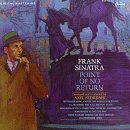|
This compact disc album might have just as accurately been titled "Frank
Sinatra - From The First To The Last," since its song program consists
of the very first recordings he undertook for Capitol Records - the final
four selections offered here, deriving from the April 2, 1953, recording
session with which he initiated his eight-year association with the label
- and, in its entirety, his final album project for Capitol, Point
Of No Return, product of two recording sessions held in September
of 1961. What unites this apparently odd coupling is the fact that on
each of the two sets of recordings, made eight-and-a-half years apart,
he was assisted by the gifted arranger-conductor Axel Stordahl. Long-time
Sinatra fans will recall that he and Stordahl had collaborated extensively
for more than a decade before the earliest of the recordings reprised
here, and it was as a result of this long, close association - paralleling
that which Sinatra enjoyed with Nelson Riddle during the singer's Capitol
years - that he first had been enabled to begin working towards establishing
his supremacy in the art of popular song. Stordahl, there can be little
doubt, helped the singer immeasurably.
The two had first met in 1940 when Sinatra joined the greatly popular
Tommy Dorsey Orchestra as featured male vocalist, replacing Jack Leonard
who had had a falling-out with the trombonist-leader. At the time Stordahl
was one of several orchestrators Dorsey employed, and over the nearly
two years the singer remained in the trombonist's band the two became
fast friends. When Sinatra made his first solo recordings outside the
Dorsey fold in January of 1942, it was Stordahl who served as his arranger-conductor.
And when the singer signed with Columbia Records in June of 1943, Stordahl
was assigned the musical direction of his recordings. Over the ensuing
ten years the two worked together almost continuously, Stordahl ultimately
being responsible for arranging and conducting more than three-quarters
of the singer's 266 recordings for the label.
It was during this period and largely, one suspects, as a result of Stordahl's
guidance no less than the poised and elegant settings he so consistently
provided the singer that Sinatra began to come into his own as a superior
interpreter of popular song. As the decade advanced and their musical
association deepened, Sinatra's singing became increasingly confident
and assured, his musicianship surer and more keenly focused, and his interpretive
abilities truer, more incisive and insightful. He became, in short, not
only the finest, most accomplished singer of his generation but was well
on his way to achieving the total, undisputed mastery of the genre he
revealed in so many of his Capitol recordings.
During the final several years the singer recorded for Columbia he found
himself increasingly at odds with his recording supervisors and especially
Mitch Miller, the label's Artists and Repertoire Director, who were urging
him to record what he felt were trivial, and often demeaning song materials.
During the late 1940s tastes in popular music had moved away from the
superior ballad standards Sinatra performed so well to a type of novelty-based
popular song that was as simplistic as it was silly, insipid and often
meaningless. Sinatra flatly refused to perform songs that, like I'm
Looking Over A Four Leaf Clover, Come On-A My House or Near you,
all major "hits" of the period, he characterized as bloodless
and decadent. So, the singer was hardly surprised when in the Fall of
1952, his recording contract up for renewal, Columbia failed to extend
it. His final recording for the label was, ironically enough, the Cy Coleman-Joseph
McCarthy ballad Why Try To Change Me Now?
In the Spring of 1953, after earlier, protracted negotiations with RCA
Victor had fizzled out, Sinatra signed with Capitol Records. To provide
the singer an easeful transition to the new label as well as allow Capitol's
recording directors time to develop a recording strategy for him, Stordahl
was engaged to supervise his first Capitol recordings. Four selections
were undertaken on April 2, 1953 - Lean Baby, I'm Walking Behind You,
Day In-Day Out and Don't Make A Beggar Of Me - all but the
first arranged by the conductor. Purposely arranged in the style of its
writer Billy May, Lean Baby was orchestrated by Heinie Beau,
another veteran of the Tommy Dorsey band who had also worked with Sinatra
and Stordahl on various of the singer's Columbia recordings. It was coupled
with I'm Walking Behind You as Sinatra's intitial Capitol single
and, on its release did moderately well, both sides garnering a fair amount
of radio play and the single selling sufficiently well to demonstrate
to Capitol executives they were on the right track. Don't Make A Beggar
Of Me was not released at the time and in fact did not appear on
record until the late 1960s, when it was included in the Capitol album
T2602. But the real trasure here is the previously unreleased version
of the lovely Rube Bloom-Johnny Mercer ballad Day In-Day Out,
with an absolutely fetching arrangement in Stordahl's most graceful manner
and a Sinatra vocal of greatly touching expressiveness. It will come as
a complete surprise even to knowledgeable fans of the singer. Not only
is it quite different from the two later recordings of the song Sinatra
did for Capitol - the Nelson Riddle-arranged and conducted version of
March 1, 1954, and the one by Billy May from December 22, 1958, offered
in the Come Dance With Me album set - but its existence was not
even known of until now, which explains why it has not been listed in
any discographies of the singer's work.
It was at the singer's second Capitol recording session that he was first
teamed up with Nelson Riddle, initiating one of the most fruitful and
artistically gratifying collaborations of his career, Riddle in a very
real sense serving Sinatra through the Capitol years as had Stordahl during
the previous decade. Riddle, in fact, arranged and conducted fully two-thirds
of Sinatra's 300-odd Capitol recordings. Other of the singer's recording
sessions were arranged by Billy May, Gordon Jenkins and Felix Slatkin,
and Stordahl was not called on again until the Fall of 1961.
By this time the singer had secured his release from Capitol in order
to form his own record label - Reprise Records, which was started in early
1961 - but under the terms of the agreement he was to make further recordings
for Capitol. The album which reunited him with Stordahl, the as it turned
out aptly-titled Point Of No Return, was the final album project
Sinatra was to undertake for the label with which he had so often and
so consistently scaled the greatest heights of his career. And although
many at the time thought the singer would turn in something of a perfunctory
job on an album recorded solely to satisfy a contractual obligation, the
results give the lie to that.
First, it was a stunning collection of songs, all excellent ballad standards
which had the added benefit of not having been over-recorded. And the
program itself was a particularly well-chosen one, alternating familiar
songs with a number of less widely known but no less worthy ballads, each
in fact gaining from contrast with the other. In his flawless, insightful
interpretations, Sinatra gave them all equal weight. He did not stint
on any of them and, rather than being indifferently performed, the performances
comprised one of the singer's most perfectly realized song programs, offering
singing of a knowingly focused, lucid, breathtaking mastery and beauty.
One would be hard pressed to instance better, more finely detailed or
beautifully shaped readings than those the singer accorded a number of
these songs - the deeply affecting September Song for example,
I'll Remember April, There Will Never Be Another You, These Foolish
Things, Memories Of You or When The World Was Young. These
performances contain, in fact, some of the most maturely confident and
rewardingly expressive singing Sinatra ever commited to record, full of
a nuanced, controlled emotionalism all the more effective for the easeful,
almost conversational naturalness with which he infused each and every
one. Simply, they are the work of a master.
The singer, there can be no doubt, was at peak vocal and expressive form
on these performances which rank with the finest, most compelling achievements
of his Capitol years. No little assistance was provided him by the lovely,
elegant and knowingly economical settings devised by Stordahl and Heinie
Beau, who orchestrated I'll Remember April and It's A Blue
World under the former's direction. Acknowledging Sinatra's primacy
in these performances, the two men provided him a perfect, unobtrusive
tapestry of orchestral textures and spare, pastel washes of color on which
to trace his special vocal magic. Rarely had the singer been so well served
by his collaborators, for throughout this immensely satisfying farewell
recital Stordahl's and Beau's orchestrations support and underscore his
masterly singing with an unerringly artful economy of expression that
can stand as the very apogee of taste, intelligence and focused discretion.
No throwaway this. Hardly. And while rarely acknowledged as such, Point
Of No Return is one of the enduringly great Sinatra albums, a marvelous
program of songs which the singer graced with some of his most deeply
sincere and affecting expressive artistry. And popular music just doesn't
get any better than this.
Pete Welding
Point Of No Return (1962)
Capitol CDP 7 48334-2
When The World Was Young
I'll Remember April
September Song
A Million Dreams Ago
I'll See You Again
There Will Never Be Another You
Somewhere Along The Way
It's A Blue World
These Foolish Things (Remind Me Of You)
As Time Goes By
I'll Be Seeing You
Memories Of You
Day In-Day Out
Don't Make A Beggar Of Me
Lean Baby
I'm Walking Behind You
Buy Point
Of No Return from Amazon.co.uk.
|
|


